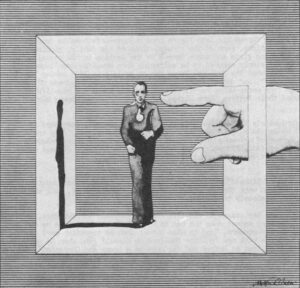My earlier newsletter described some of the mail generated by the adult development theory being researched under the auspices of the Alicia Patterson Foundation. As the letters continued to pour in after a preliminary article appeared I was fascinated to be able to detect the age of the correspondents by their observations.
For example, in describing young people in their 20s — I called them “provisional adults”-I mentioned that they “commonly insist that what they are doing is the true course in life.” Almost all the letters from men and women in this particular age group seemed to insist that the theory was wrong and their view was right. Most of them were peeved with me for not seeing them as unique.
I had written:
Doing what they “should” is the strongest motif.
Two impulses are at work. One is to build a firm, safe structure for the future by making strong commitments, to “be set.” The other urge is to explore and experiment, keeping any structure tentative. The balance struck between these two impulses defines the differences in the way people pass through Provisional Adulthood, and the way they feel at the end of it.
I went on to outline the extremes-those young people who are “locked in” or are “transients”-then added:
For more contemporary provisional adults, this translates into the push to follow the counterculture “system…” making this age group careful to follow the rules of anti-materialism and recreational sex and to be anxious for promotion within the ideological movement particular to the tires. Whether it be political, spiritual, or sexual-civil rights, radical protest, the Children of God, or Gay Liberation-it is still a system with rules which are followed as “shoulds” and unchallenged by any lively amount of introspection. It is, after all, the flip side of their parents’ image of themselves as righteous practitioners of the American Dream.
But to tell that to 25-year-olds will call forth a tooth-and-nail fight, as loud a protest as telling their more structured peers that they are just like their mothers and fathers in some ways. That is precisely the inner reality from which they are trying to make a break. At 30, they would not be as uneasy with the idea.
Most of my correspondents in their 20s were argumentative:
With the idealism of a 25-year-old who will fight “tooth and nail” at the suggestion that his life is the “flip side” of his parents’ vision of the American Dream, I feel you have ignored certain relevancies in your blueprint. The present is sacrificed to the plan; professional aspirations and personal relationships are externalized until their value is lost to their creator.
There are crises in life (no doubt); each day is perhaps a small one. As Erikson says, in Identity, Youth and Crisis, there are times when mini-crises are compounded and a major crisis develops. Yet the crisis and the individual are inseparable. What you have done is to abstract your Freudianism to a non-compassionate/anti-humanistic degree. An identity crisis is a difficult enough experience without the idea that my presence in the crisis is superfluous. (If I’m not there on time, start the crisis without me.)
The chronological age growth experience described has one major shortcoming — it overlooks an individual’s potential to transcend age. As Juan Matus relates to Carlos Castaneda, there are many realities to see. By erasing our personal histories and losing our images of -self-importance, we can begin to experience the many dimensions of reality that exist in the world. In so doing, we can live each moment to its fullest. Although few of us are interested in so doing, it seems that one could transcend the comparatively petty problems of aging in a restricted society. Castaneda’s books offer an enchanting alternative to the fates your article portends.
The outlook is extremely dismal, don’t you think?
Ever since I was old enough to “grow-up” people have been calling me naive. “You really expect too much,” is a common accusation to the way I enjoy my life. I’m 22-1/2, one year out of college and enjoying an unattached life within my system…. From most of the texts one would imagine that the whole world is on the verge of suicide at worst and just making it at best. I believe this is really degrading to the human race as a whole. I’ve met many disoriented people in my few years but I’ve also encountered superlative individuals who I believe typify what a person, a human being, can be…. I feel you are taking such a limited view of what can and actually does happen that if someone my age were to take stock in your world view he would be washed up by the age of 30… I would hope that people in the behavioral sciences will begin to expect more out of people and out of themselves. It seems the world is filled with children, very sad children. The species has been making a poor showing for some time. We could emphasize the works of the complete, mature few, however we define those terms.
I really believe that there is more than just survival.
The article loses me when the observations become judgments and you begin to suggest that we exchange one set of life dictating “shoulds” for another. You label some well-known extremes (e.g., the “locked in” and the “transient” in their 20s) and proceed to criticize their dependence upon group dictated values or “shoulds.” You then go on to explain’ to us the appropriate behavior, by which we can all “progress faster along the track toward self-authority.” The result is merely another “should,” only this time dictated by sociological research telescoped through just another set of values.
What adults need in life is not less but more tolerance of diversity and more openings to all possible lifestyle options. To investigate, observe and comment upon those options can be both interesting and informative. To limit those options is too great a “should” for anyone, whether cloaked in professionalism or not, and does a disservice to all individuals seeking the life which suits them best.
The four letters above were from young men. I also heard from young women:
But, please, one moment. You write, “Crises are good. They keep us from slipping into a rut.”
Picture banjo music and laughter:
Read:
“Rolling in my sweet baby’s arms
Rolling in my sweet baby’s arms
Going to lay round our shack
‘Til the mail train comes back
Rolling in my sweet baby’s arms.”It comes to my mind that this sounds like a cozy, inviting, non-tension rut. Only an example, but why is it considered not healthy, even shameful to find oneself a warm rut, settle in, and let it be. Is striving a must, like breathing? Why not ruts?
My answer to her would be that adults, like children, appear to alternate between stages of equilibrium-when they are more in step with themselves and the people and outer forces in their world — and periods when they are off-balance, uncertain, in the process of outgrowing their former life structure and perhaps even their partners. Ruts can be good, too. One of the things we are striving for while passing through a period of disruptive change is the regained equilibrium and stability on the other side. Ruts give us time to breathe and be.
I was pleased with the perception of a young woman in California:
About a week ago, as I was browsing through a card store, I came across a plaque, which I felt compelled to purchase. I didn’t quite realize why, but I knew that its message pertained not only to myself (22) and friends my own age, but also to several people I knew in their late 20s and 30s. While reading your article…I realized why this plaque I had purchased was relevant.
“IT’S WHAT WE LEARN AFTER WE THINK WE KNOW IT ALL THAT COUNTS.”
(TO BE CONTINUED)
Received in New York on September 23, 1974.
©1974 Gail Sheehy
Gail Sheehy is an Alicia Patterson Foundation award winner on leave from New York Magazine. This article may be published with credit to Ms. Sheehy, New York Magazine, and the Alicia Patterson Foundation.



